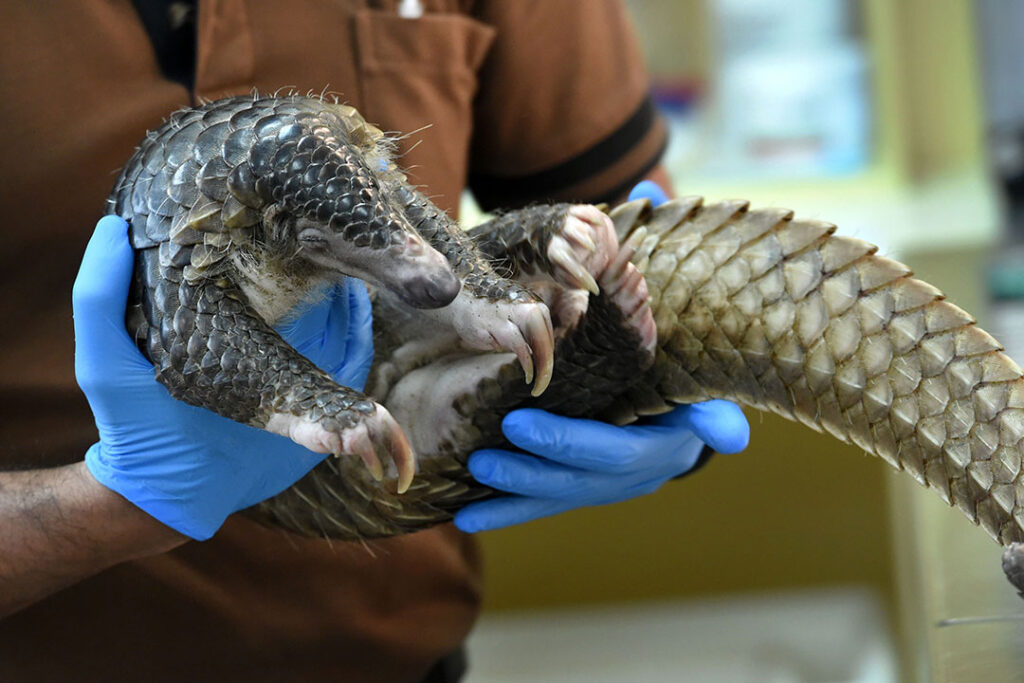ADF STAFF
Could the world’s most illegally trafficked animal be linked to the coronavirus?
Two groups of viruses similar to the one causing the human pandemic have been identified in Malayan pangolins smuggled into China, the BBC reported. Although the animals’ role as an intermediary host in the outbreak has not been officially verified by an independent global health authority, sales of wildlife animals such as pangolins are increasingly being prohibited in Asia’s wet markets. These outdoor markets where live animals are killed and butchered on-site, often in unsanitary conditions, have been the source of disease outbreaks in recent years.
The current hypothesis by scientists is that horseshoe bats infected pangolins with SARS-CoV-2, the virus that causes COVID-19. The pangolins then came into contact with or were consumed by humans through a seafood wet market in Wuhan, China, resulting in the pandemic.
The deadly severe acute respiratory syndrome, or SARS virus, that originated in China’s Yunnan province in 2002 is also believed to have started with horseshoe bats infecting wild mammals known as civets and spreading to humans through the wet markets.
The Journal of Proteome Research and the United Nations Office on Drugs and Crime have concluded that the pangolin is the leading suspected intermediate link in the transmission of COVID-19 between bats and humans. Earlier studies in February cast doubt on the Pangolin as the original source of the outbreak, as the genetic connection of the coronavirus to pangolins was only between 85% and 95%, according to Arinjay Banerjee, a coronavirus expert at McMaster University in Canada.
The World Health Assembly, the key decision-making arm of the World Health Organization, met virtually on May 18 and voted for an international investigation into the source of the virus that causes COVID-19. The draft motion urges the international health community to “identify the zoonotic source of the virus and the route of introduction to the human population.”
Different species of pangolins range from the size of a small cat to as much as 70 pounds and have tongues that can be longer than their bodies. Pangolins are the most illegally traded wild animal in the world.
The animals are hunted throughout Asia and Africa where they are bought and sold illegally, mainly to China, for their scales and meat. Pangolin scales are made of keratin, which also is found in human hair and nails. The scales are an ingredient used in traditional Chinese medicine even though keratin has no medicinal value.
In April 2019, customs officers in Singapore inspected a shipping container and found almost 13 tons of pangolin scales, valued at $39 million. Less than a week later, they found a similar shipment. In all, poachers slaughtered 72,000 pangolins to produce the two stashes. The U.N. says that between 2014 and 2018, authorities seized the equivalent of 370,000 pangolins.
There are eight species of pangolins — four in Asia and four in Africa. In 2016, all pangolin species were placed on the protected list kept by the Convention on International Trade in Endangered Species of Wild Fauna and Flora.
The U.N. found that as Asian supplies of pangolins decreased from overhunting, illegal traders turned to Africa to fill demand. Starting in 2013, West and Central African nations such as Nigeria and Cameroon were major suppliers of pangolin scales and meat. More recently, Côte d’Ivoire, Guinea and Liberia have become involved in the illegal trade.
The U.N. reported that hunters can earn from $8 to $13 for a small live pangolin and $25 to $30 for a large one. In Uganda, hunters reported catching as many as 20 per day. Once caught, pangolins are placed in hot water or fire to remove their valuable scales.
Scientists continue looking for the source and mode of transmission of the current COVID-19 outbreak to humans. Observers hope the recent announcement by the Chinese government that it will cooperate in establishing an impartial international investigation signals a willingness to allow research to proceed.
Being associated with a global pandemic may be a blessing for the endangered pangolin. In February, China announced a ban on its citizens eating pangolins, along with other wild animals such as badgers, peacocks and civets, although online ‘black market’ sales have skyrocketed in the country. Gabon also banned the consumption of pangolins in March. Conservationists hope that the pandemic will lead to an international moratorium on using pangolins, in particular, for their meat and body parts.

